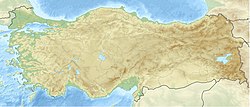2003 Bingöl earthquake
| UTC time | 2003-05-01 00:27:04 |
|---|---|
| ISC event | 6832154 |
| USGS-ANSS | ComCat |
| Local date | 1 May 2003 |
| Local time | 03:27 local time |
| Magnitude | 6.4 Mw[1] |
| Depth | 15 km (9.3 mi)[2] |
| Epicenter | 38°57′N 40°24′E / 38.95°N 40.4°E[2] |
| Type | Strike-slip[1] |
| Areas affected | Turkey |
| Max. intensity | MMI IX (Violent)[3] |
| Peak acceleration | 0.55 g[3] |
| Landslides | Yes[3] |
| Casualties | 177 killed, 520 injured[1] |
The 2003 Bingöl earthquake hit eastern Turkey with a moment magnitude of 6.4 and a maximum Mercalli intensity of IX (Violent) on 1 May at 03:27 local time. The epicenter of this strike-slip earthquake was in Bingöl Province, 15 km north of Bingöl. At least 177 people were killed, and 625 buildings collapsed or suffered heavy damage in the affected region. Eighty-four of the fatalities occurred when a dormitory block collapsed in a boarding school in Celtiksuyu.[4]
Tectonic setting
[edit]Most of Turkey lies on the Anatolian Plate, which is being forced westwards by the collision between the Arabian plate and the Eurasian plate. This westward movement is accommodated by two large strike-slip fault zones, the west–east trending right lateral North Anatolian Fault in the north of the country and the SW-NE trending left lateral East Anatolian Fault towards the south-east. Movement on these two faults have been responsible for many large and damaging earthquakes historically.[5]
Earthquake
[edit]The earthquake occurred on May 1, 2003, with a depth of 15 km (9.3 mi).[6] It was a strike-slip event, lasting about 17 seconds with a magnitude of 6.4. It occurred at 3:27 am local time.[7] The strike-slip fault responsible was not the East Anatolian Fault; it ruptured a right-lateral strike-slip fault perpendicular to the East Anatolian Fault.[8]
Damage
[edit]
The earthquake damaged hundreds of buildings made of reinforced concrete and masonry. Many school buildings constructed within the last six years were heavily damaged.[9] A total of 177 people were killed.[1] 84 of the fatalities occurred when a dormitory block collapsed in a boarding school.[10] A total 8,417 houses being damaged, of which 305 collapsed, 3,000 heavily damaged, 2,566 moderately damaged, and 2,546 slightly damaged. More than 90% of the schools in Bingöl were impacted, four schools collapsed, and 11 were lightly damaged. The school where the dormitory block collapsed was a 5-story building, which itself collapsed within seconds. Three hospitals in Bingöl were damaged.[7]
See also
[edit]References
[edit]- ^ a b c d PAGER-CAT Earthquake Catalog, Version 2008_06.1, United States Geological Survey, September 4, 2009, archived from the original on 2020-03-13
- ^ a b ISC (2015), ISC-GEM Global Instrumental Earthquake Catalogue (1900–2009), Version 2.0, International Seismological Centre
- ^ a b c "M6.4 – eastern Turkey". United States Geological Survey.
- ^ "Quake headteacher speaks of ordeal". BBC News. May 4, 2003.
- ^ "M 6.7 – 13 km N of Doganyol, Turkey".
- ^ "ISC-GEM Catalogue – Introduction".
- ^ a b "Turkey: Earthquake in Bingol Province" (PDF). International Federation of Red Cross and Red Crescent Societies. May 7, 2003.
- ^ Milkereit, C.; Grosser, H.; Wang, R.; Wetzel, H.-U.; Woith, H.; Karakisa, S.; Zünbül, S.; Zschau, J. (2004). "Implications of the 2003 Bingöl Earthquake for the Interaction between the North and East Anatolian Faults". Bulletin of the Seismological Society of America. 94 (6): 2400–2406. Bibcode:2004BuSSA..94.2400M. doi:10.1785/0120030194.
- ^ Kaplan, Hasan; Yilmaz, Salih; Binici, Hanifi; Yazar, Erhan; Çetinkaya, Nihat (June 2004). "May 1, 2003 Turkey—Bingöl earthquake: damage in reinforced concrete structures". Engineering Failure Analysis. 11 (3): 279–291. doi:10.1016/j.engfailanal.2003.08.005.
- ^ "Quake headteacher speaks of ordeal". BBC News. May 4, 2003.
Further reading
[edit]- Aydan, Ö.; Ulusay, R.; Miyajima, M. (2003), The Bingöl earthquake of May 1, 2003 (PDF), Japan Society of Civil Engineers
- Ulusay, Reşat; Aydan, Ömer (2005). "Characteristics and geo-engineering aspects of the 2003 Bingöl (Turkey) earthquake". Journal of Geodynamics. 40 (2–3): 334–346. doi:10.1016/j.jog.2005.07.018. ISSN 0264-3707.
External links
[edit]- The International Seismological Centre has a bibliography and/or authoritative data for this event.
- ReliefWeb's main page for this event.

